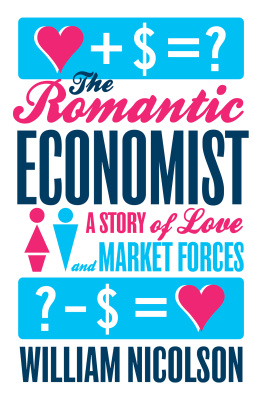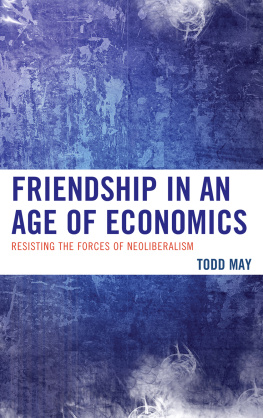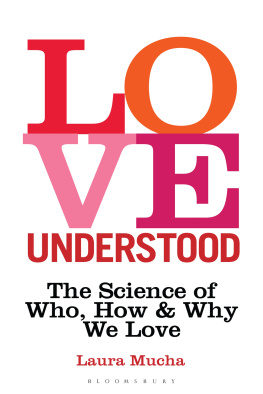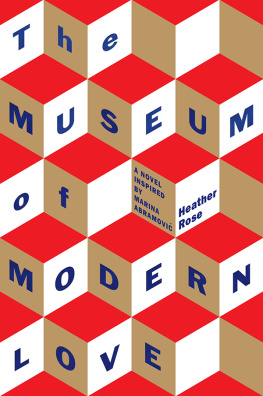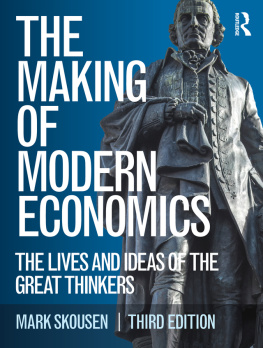DOLLARS
AND SEX
HOW ECONOMICS INFLUENCES SEX AND LOVE
DR. MARINA ADSHADE

Copyright 2013 by Marina Adshade.
All rights reserved. No part of this book may be reproduced in any form without written permission from the publisher.
ISBN 978-1-4521-2695-1
The Library of Congress has previously catalogued this as follows:
Adshade, Marina.
Dollars and sex : how economics influences sex and love / by Marina Adshade.
p. cm.
Includes bibliographical references.
ISBN 978-1-4521-0922-0
1. Interpersonal relationsEconomic aspects. 2. SexEconomic aspects. 3. Mate selectionEconomic aspects. I. Title.
HM1106.A334 2013
306.7dc23
2012031593
Designed by Allison Weiner
Cover illustration by Arthur Mount
Chronicle Books LLC
680 Second Street
San Francisco, California 94107
www.chroniclebooks.com
CONTENTS
INTRODUCTION
HAVE YOU EVER WONDERED if national well-being is higher in countries in which men have larger penises than in those in which men are less well-endowed? Or, more to the point, does it surprise you to learn that upon discovering the Global Penile Length Distribution Map that an economist started looking around for an economic question that the data might answer?
Economics is called the dismal science, but it didnt earn that moniker because economists failed to predict the most recent global recession or, for that matter, pretty much every recession in history. It is because erstwhile economist-cum-parish priest Thomas Malthus, at the end of the eighteenth century, predicted that as long as British peasant women couldnt keep their knees together there was no hope for society to prosper.
When it comes to sex, Malthus, admittedly, was a bit of a downer. But not all economists take such a dismal view of what is one of lifes sweetest pleasures. In the past ten years, in particular, there has been a frenzy of research activity as academics have eagerly used economic theory and data in exploration of matters of the heartand other body parts.
The resulting body of literature is a collection of theories and evidence that would give anyone, frankly, a hard-on for economics.
Which was exactly the reaction I was looking for when four years ago it occurred to me that talking about sex and love could be a terrific way to get my university students excited about the prospect of learning economics.
Over time I came to realize that what started out as a fun collection of topics designed to help my students understand the way that markets operate was evolving into a completely novel way for them to understand their place on the market for sex and love. They began to appreciate the way in which economics influences their mating behavior and to apply the concepts we covered in class to their own lives.
It wasnt just my students perspective that was changing. Once I started exploring ways to apply economic reasoning to issues of sex and love, I came to realize how much clarity viewing the world through an economists lens affords me when thinking about more intimate matters in my own life.
Let me give you a brief, personal, example.
I had never really thought that online dating sites were a good place for me to look for a mate (for reasons that I will talk about later). But then I started to think about the difference between thick and thin markets. Markets that are thin have few participants, making it difficult for buyers and sellers to settle on a price at which they both want to trade. Markets that are thick, however, have many participants, meaning that it is possible to settle on a price at which both buyer and seller are willing to trade.
Online dating sites really are thick markets. If I interpret the price at which I am willing to trade, as both buyer and seller on this market, in terms of meeting a man who is the best possible match for me, while at the same time I am the best possible match for him, then it actually makes sense for me to search online for a relationship. Its not because it is easier (in many ways it is not) but because in a thicker market it should be possible for me to find a man with whom to have a higher-quality relationship.
That is my theory, at least; I have yet to test it.
I argue that almost every option, every decision, and every outcome in matters of sex and love is better understood by thinking within an economic framework. In fact, I would go further than that and say that without taking into consideration economic forces, our understanding of the world around us is incomplete. That is as true when we are trying to decide if we believe the government should subsidize access to birth control as it is when we are trying to decide if we believe that the government should bail out big business. It is as true when we are assessing the costs of being personally promiscuous as it is when assessing the costs of spending one more year of our lives in school. And it is as true when we are choosing whether or not we want to risk having sex outside of our marriage as it is when we are choosing whether or not we want to risk putting our savings into the stock market.
Dollars and Sex is a collection of different styles of stories that illustrates the way in which economic theory can complete our understanding of sexual relationships in todays world. Some are short stories, scattered throughout the book, that illustrate how economic forces can influence an individuals sexual behavior (all are true, to some degree, with the names changed to protect the sometimes less-than-innocent). Some are stories told with data. Statistics have the power to reveal the choices of, literally, thousands of men and women in a way that satisfies the economic desire to find measurable relationships between particular situations and the decisions that people in those situations make. Finally, there are the stories that give us a framework for understanding the decisions we all make at some points in our lives. Those are the stories told by the economic theories that are used to model the markets for sex and love.
The book is organized in three acts, each representing a different stage of our lives, with each act broken down into three chapters.
In act I, I consider the lives of those who are young, wild, and free. Revolutions are often started for economic reasons, and the Sexual Revolution was no different; the liberalization of sexual values over the second half of the twentieth century is an economic story in which individuals have weighed the cost of premarital sex against the benefits and decided that the answer to the question Should I have sex tonight? is Why not? One group that has embraced this liberalized view of sexuality with enthusiasm is college students, but their market for sex and love is not necessarily in equilibrium. Now that female students outnumber male students, there is more casual sex on college campuses and traditional dating has gone the way of the dinosaurs. Speaking of the end of traditional dating, the final chapter in act I is about the online market for sex and love; on behalf of the economics profession, I would like to take this opportunity to thank you for participating in this massive data-collection exercise that has helped us understand how men and women everywhere search for love.
Most of us eventually reach a stage of our lives when we feel that the person who has been leaving a toothbrush at our place for months really should stay a little longer, which brings us to act II. In marriage, as in life, we dont always get what we want, but hopefully we have set our reservation value for a mate high enough and have sufficient opportunities to exploit the gains from trade within marriage, that we get what we need (romantic, I know; wait until you see my idea for economic wedding vows!). Marriage is not always the union between one man and one woman; there are alternatives to that arrangement, and economic factors have played a big role in influencing which arrangements are legally, and socially, acceptable. The final chapter in act II is about the way in which couples decide whose turn it is to be on top. Okay, that is a bit of an oversimplification, but we will talk about bargaining within marriage because, as everyone who has been married knows, the negotiations dont stop just because the marriage contract has been signed.


